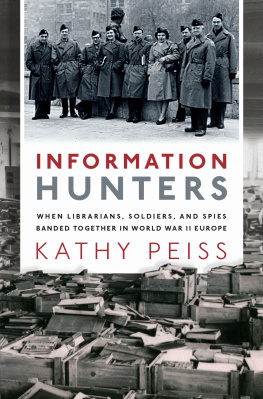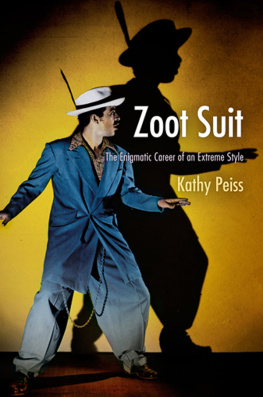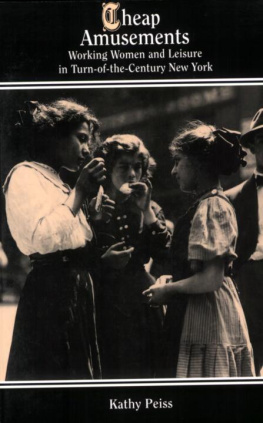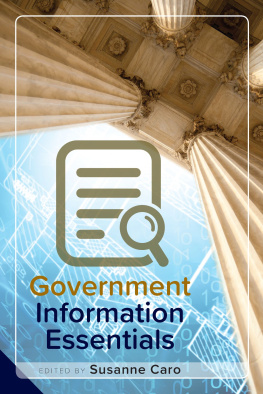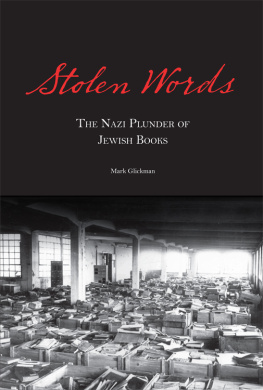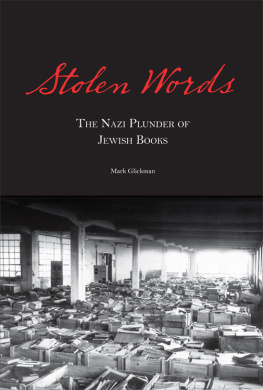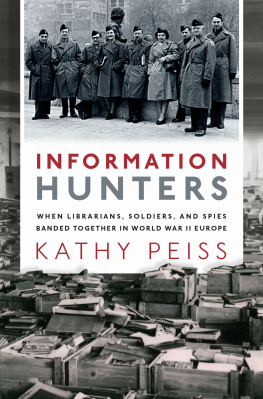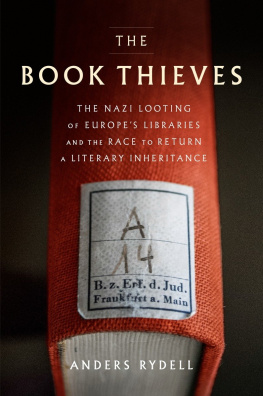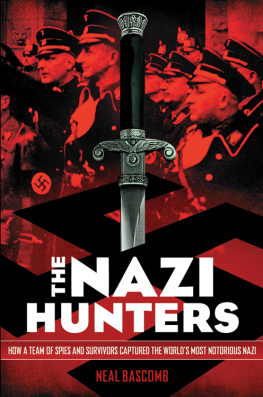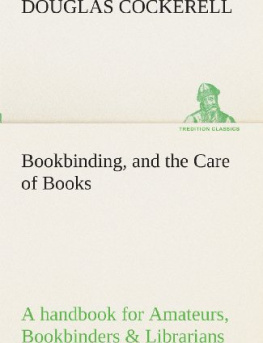Information Hunters

Oxford University Press is a department of the University of Oxford. It furthers the Universitys objective of excellence in research, scholarship, and education by publishing worldwide. Oxford is a registered trade mark of Oxford University Press in the UK and certain other countries.
Published in the United States of America by Oxford University Press
198 Madison Avenue, New York, NY 10016, United States of America.
Kathy Peiss 2020
All rights reserved. No part of this publication may be reproduced, stored in a retrieval system, or transmitted, in any form or by any means, without the prior permission in writing of Oxford University Press, or as expressly permitted by law, by license, or under terms agreed with the appropriate reproduction rights organization. Inquiries concerning reproduction outside the scope of the above should be sent to the Rights Department, Oxford University Press, at the address above.
You must not circulate this work in any other form and you must impose this same condition on any acquirer.
Library of Congress Cataloging-in-Publication Data
Names: Peiss, Kathy Lee, author.
Title: Information hunters : when librarians, soldiers, and spies
banded together in World War II Europe / Kathy Peiss.
Other titles: When librarians, soldiers, and spies banded together in World War II Europe
Description: New York, NY : Oxford University Press, [2020] |
Identifiers: LCCN 2019015762 | ISBN 9780190944612 (hardback) |
ISBN 9780190944636 (epub) | ISBN 9780190944629 (updf)
Subjects: LCSH: World War, 19391945Confiscations and contributionsEurope. |
World War, 19391945Military intelligenceUnited States. |
BooksEuropeHistory20th century. | Intelligence serviceUnited States
Information services. | Acquisitions (Libraries)United StatesHistory
20th century. | Cultural propertyProtectionEuropeHistory20th century. |
LibrariansUnited StatesHistory20th century. | World War, 19391945
Destruction and pillageEurope. | United States. Office of Strategic Services. |
Library of Congress Mission to Germany.
Classification: LCC D810.C8 P45 2020 | DDC 940.54/8673094dc23
LC record available at https://lccn.loc.gov/2019015762
For Peter
Once again, and always
Contents
I began this project knowing little about the history of books, information, the military, or intelligence. I am grateful to many individuals and institutions who have helped me pursue this work over a number of years. Fellowships from the American Council of Learned Societies, the Radcliffe Institute for Advanced Study, and the John Simon Guggenheim Memorial Foundation supported my research, and a Deans Leave from the School of Arts and Sciences at the University of Pennsylvania gave me time to write. A Gilder Lehrman Foundation Fellowship and Hoover Presidential Library Association Travel Grant facilitated visits to collections. For archival materials, I thank the British Library, Center for Jewish History, Herbert Hoover Presidential Library, Hoover Institution Library and Archives, Library of Congress, National Archives at College Park, The National Archives (UK), New York Public Library, Wisconsin Historical Society, and the archives and special collections libraries at Columbia University, Harvard University, Massachusetts Institute of Technology, Princeton University, Stanford University, Trinity College, University of Illinois, University of Pennsylvania, University of Regina, University of Virginia, and Yale University. I am indebted to librarians and archivists George Boziwick, Kyle DeCicco-Carey, Miles Crowley, Tim Driscoll, Ernest Emrich, Michelle Gachette, Ed King, Larry MacDonald, Melanie Meyers, Harry Miller, Jim Moske, Josephus Nelson, Richard Peuser, Chris Prom, Matt Schaefer, Elizabeth Seitz, Joe Weber, Sarah Wipperman, Craig Wright, and Penns Interlibrary Loan staff.
I am especially grateful to the extraordinary librarian-scholars at the University of Pennsylvania, who have been engaged with this work and assisted me in so many ways: Lynne Farrington, Mitch Fraas, Arthur Kiron, Bruce Nielsen, Nick Okrent, John Pollack, and Daniel Traister. Library historians Alistair Black, Maria Gonzalez, Miriam Intrator, and Boyd Rayward gave me needed guidance in a new field.
Many individuals directed me to sources, suggested readings, and provided advice, including Mark Bergman, Roger Chartier, David Engerman, Astrid Eckert, Ronald Granieri, John Hench, Nathan Ensmenger, Hemant Shah, Nancy Sinkoff, Melissa Teixera, Judith Vichniac, and Noam Zadoff. Others offered insightful comments on chapters and presentations: Ayelet Brinn, Kevin Boyle, Andrew Cayton, Sarah Barringer Gordon, Arthur Kiron, Amy Offner, Simon Richter, Sophia Rosenfeld, Dan Schiller, Katrin Shreiter, and Beth Wenger. I am grateful to Billy Coleman, Rebecca Cutler, Simon Ertz, Laura Freeman, Raquel Kirby, Josef Nothmann, Vanessa Smith, Aro Velmet, and Binghao Zhao for research assistance; thanks especially to Leead Staller, Elizabeth Vaziri, and Shane Wilson. I have benefited from audience questions and remarks when I have presented my work at the American Library Association Library History Round Table, the Institute of Historical Research (London), Kings College London, Radcliffe Institute, St. Josephs University, Smith College, University of Delaware, University of Illinois, University of Melbourne, University of Michigan, Woodrow Wilson International Center for Scholars, the Yale Program in the History of the Book, and at Penn, the History Departments Annenberg Seminar, the History and Sociology of Science Workshop, the Wolf Humanities Center, and the Workshop in the History of Material Texts.
I was fortunate to discover several family members of those who had participated in the collection and preservation of books during the war. I am deeply grateful to Susan Josephson for sharing a portion of her father Glenn Goodmans unpublished memoir; reading it shed new light on the restitution effort. Eric Andersson told me family stories about his great-aunt Adele Kibre, which illuminated a woman of mystery. Alex Zuckerman, with Miriam Intrators kind assistance, allowed me to read the letters of his father, Jacob Zuckerman. I also appreciate conversations with Yvonne Pine and Robert Sargeant. Early in the project I met Frederick and Eleanor Kilgour, who welcomed me to their North Carolina home. Finally, thanks to Saul and Joanne Pasternack for hosting a dinner with relatives who told stories about Reuben Peiss; to Susan Goldschmidt Ellis for sharing photographs and a home movie; and to Barbara Grossman, who copied a handful of Reubens letters and photographs.
My editor Susan Ferber followed this project for many years, and her editorial work and encouragement have been invaluable. My agent Lisa Adams lifted my concerns and made some key intellectual contributions to this work. It has been a great pleasure to work with them. My revisions were guided by the insightful reports of three anonymous reviewers for Oxford University Press. I am also grateful to production manager Jeremy Toynbee, copy editor Michael Sandlin, and indexer Alexander Trotter.
I owe special thanks to a handful of friends and colleagues. Bruce Kuklick supported me in this project from the beginning. His questions, suggestions, and readings of my work have made this a better book. Jennifer Rodgers also helped in innumerable ways, including sharing sources from her own work and commenting on the full manuscript. Conversations with Antonio Feros, Judy Gerson, Sally Gordon, Stephanie McCurry, Barbara Savage, and Susan Strasser inspired and enlightened me on many occasions. My husband Peter Agree has sustained me in this work and in life, in ways great and small. His curiosity about people and insight into the past, his attention to every page, his daily support and love mean everything to me. I am grateful beyond words.

